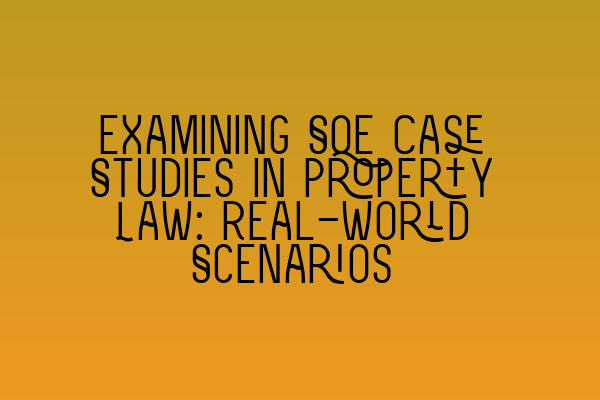Examining SQE Case Studies in Property Law: Real-World Scenarios
Welcome to the SQE Property Law blog at SQE Property Law & Land Law! In this article, we will delve into the world of property law case studies, exploring real-world scenarios that can help you understand the practical application of property law principles. Understanding how property law works in practice is essential for aspiring solicitors, and these case studies will provide invaluable insights.
Why Study Property Law Case Studies?
Property law is a complex field that requires a deep understanding of legal principles along with practical application. While studying the theoretical aspects of property law provides a solid foundation, case studies allow you to see how these principles work in real-life situations.
By examining case studies, you can develop problem-solving skills and gain a better understanding of how to apply the law to various scenarios. Through these studies, you will encounter different nuances and complexities that can help you think critically and develop a strategic approach to property law.
Real-World Scenarios: Property Law Case Studies
Let’s dive into some real-world scenarios that will illustrate the intricacies of property law:
Case Study 1: Residential Lease Dispute
In this case study, we will explore a dispute between a landlord and a tenant over the terms of a residential lease agreement. We will examine the legal rights and obligations of both parties, including issues such as rent increases, repairs, and eviction procedures.
SQE 1 Practice Exam Questions and SQE 1 Practice Mocks FLK1 FLK2 will help you test your knowledge and understanding of property law principles relevant to this case study.
Case Study 2: Commercial Property Development
In this case study, we will explore the legal process and considerations involved in a commercial property development project. We will examine the various agreements, permits, and regulations that need to be considered when acquiring land, obtaining planning permission, and negotiating leases with potential tenants.
If you are preparing for the SQE exams, SQE 2 Preparation Courses and SQE 1 Preparation Courses can provide comprehensive study materials and guidance on property law topics relevant to this case study.
Case Study 3: Adverse Possession
In this case study, we will explore the concept of adverse possession, wherein a person gains legal ownership of a property through continuous and uninterrupted possession over a specified period of time. We will examine the legal requirements and implications of adverse possession and its potential impact on property ownership.
Benefits of Studying SQE Property Law Case Studies
Studying property law case studies can offer various benefits to aspiring solicitors:
- Enhances problem-solving skills and critical thinking abilities
- Provides practical application of legal principles
- Improves understanding of complex property law concepts
- Prepares for potential scenarios encountered in legal practice
- Facilitates strategic and effective legal decision-making
As the SRA SQE Exam Dates approach, it is crucial to supplement your theoretical knowledge with practical insights from case studies.
Conclusion
Studying property law case studies is an essential part of your preparation for the SQE exams. By analyzing real-world scenarios, you can develop a deeper understanding of property law principles and their practical applications. Remember to check out our related articles for additional resources:
